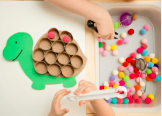Curiosity is a natural part of a child’s growth. When nurtured early, it becomes the foundation for lifelong learning. Young children who are encouraged to ask questions, explore ideas, and discover new things tend to develop stronger problem-solving skills and a deeper love of learning. Supporting this curiosity doesn’t require complicated tools—just mindful attention and a nurturing environment.
Create a Question-Friendly Space
Children are naturally full of questions. Instead of giving quick answers or brushing them aside, take time to explore the questions together. Show that asking “why” or “how” is welcome in your home or classroom. This creates a safe space for exploration, where curiosity feels exciting, not intimidating.
Offer Open-Ended Activities
Open-ended play, such as building with blocks, drawing freely, or creating with modeling clay, encourages imagination and experimentation. When there’s no single right answer, children feel more confident trying new things and following their ideas to see where they lead.
Explore Everyday Wonders
You don’t need expensive materials to spark curiosity. Nature walks, kitchen experiments, or even watching ants carry food can turn into moments of discovery. Ask open questions like, “What do you think is happening?” or “Why do you think that works?” to promote thinking and reflection.
Model Curiosity Yourself
Children learn a lot by watching adults. When you wonder aloud, read new books, or try unfamiliar tasks, you demonstrate that curiosity is something to value at any age. Your enthusiasm becomes contagious.
Support Interests and Passions
If a child is fascinated by dinosaurs, space, or music, lean into that interest. Visit the library together, find simple documentaries, or provide themed activities that build on their excitement. Deep exploration of a single interest can fuel their drive to learn more.
Limit Overscheduling
While activities and classes have their benefits, too many can crowd out unstructured playtime, which is essential for self-directed exploration. Make sure children have time to just wonder, wander, and play without a set agenda.
Praise Effort and Exploration
Instead of focusing only on right answers or achievements, celebrate the process of learning. Praise children when they try something new, ask thoughtful questions, or stay curious even when something is challenging.
Conclusion
Encouraging curiosity in young learners means creating an environment where questions are celebrated, exploration is supported, and discovery is part of daily life. With consistent encouragement and gentle guidance, we can help children develop into lifelong learners who see the world as a place full of fascinating things to understand.














